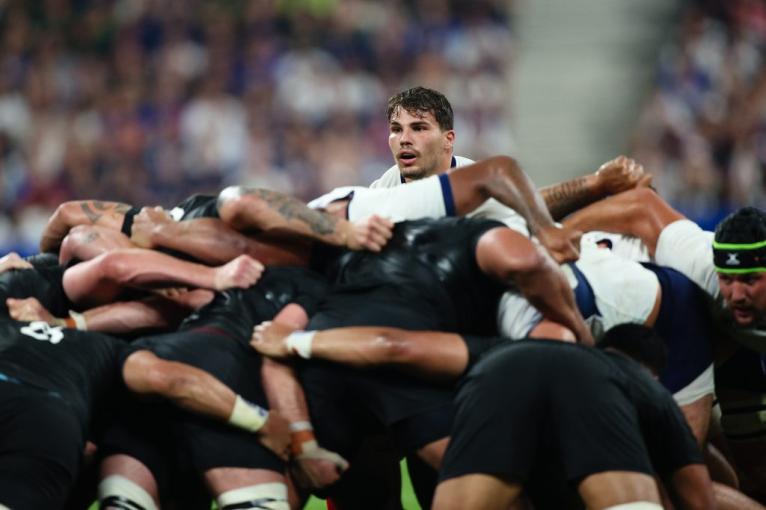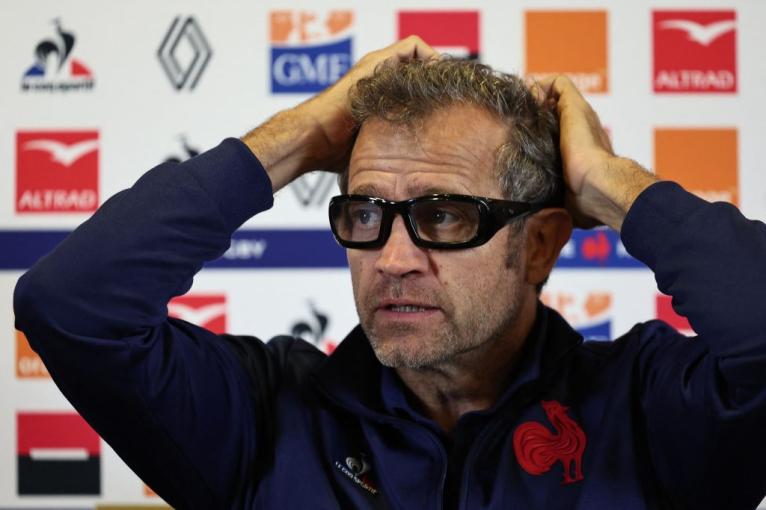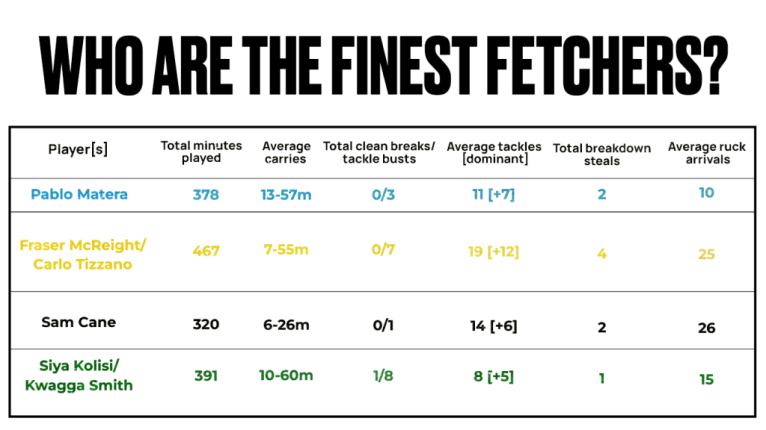Imagine for a moment, Antoine Dupont’s rugby bucket list. Gold medal at the Olympic Games – tick. A World Cup winner’s medal – to do. Somewhere between those two, but considerably closer to the summit represented by World Cup victory, would be a series triumph in New Zealand.
Unfortunately, it now seems ‘the best player in the world’ may never get the chance to sample that unique experience. The recent announcement by France head coach Fabien Galthié that the top 20 French players are likely to be withdrawn from the 2025 tour of the shaky isles means Dupont will never get to savour New Zealand, nor New Zealand enjoy the full array of his talents.
Without the royal seal provided by a winning tour of one of the two greatest rugby nations on the planet [New Zealand and South Africa], Dupont can never advance from ‘best player in the world’ to ‘greatest of all time’. Gareth Edwards did both, and therein lies the legitimacy of his own claim to be greatest rugby athlete of the amateur era. Edwards never shirked a challenge.

In June, Galthié revealed the grand plan to French newspaper L’Equipe:
“We follow 100 players but we have identified a ‘premium’ group of 20.
“We want them to have consistent development. We want to work hand-in-hand with the league and the clubs. Our goal is for players to be able to give the best of themselves in the French team, but also in-club. We want to go further [nationally], while taking into account the challenges of the clubs.
“Players will benefit from four mandatory weeks off, and four weeks without matches. We built on trust while adjusting the management of the international season by choosing to rest our ‘premium’ players during the summer tours.
“It was a first step. We want to go even further which will mean we will go on tour in the summer of 2025 in New Zealand without our ‘premium’ players. It’s been like this for four years. Why change strategy? Because we’re travelling to the All Blacks? You have to be consistent.”

The undercurrent to Galthié’s comments is the universal theme of co-operation [or otherwise] between club and country. France features the longest domestic season of any in the world – 26 regular season games plus three potential knockout rounds – which means a top club such as Stade Toulousain could be playing from the middle of August until the end of the following June – a 10-and-a-half-month season. Compared to that gruelling marathon, Super Rugby Pacific seems a nonchalant dawdle, a brief four-month jog in the park.
With the broadcasting deals brokered by the Ligue Nationale de Rugby [LNR] leading the game financially, and two fully professional tiers in place, club rugby is the priority in France, and the union – the Fédération Française de Rugby [FFR] – has work around its needs. In New Zealand it is precisely the opposite, with the All Blacks brand all-powerful.
The domestic agreement between LNR and FFR is a neat work-around of World Rugby’s regulation 9, which is designed to ensure the availability of top players for all international windows. But it does nothing for NZR, who recently posted a loss of NZD $8.9m back in June. No Dupont means less public interest in the tour, less marketability and ultimately smaller revenue streams.
Down south, the view will be that two contrasting models of the game have collided, and the international-led version has come out the loser. Earlier in the week, the two-headed French governance hydra had announced no players who played in the Top 14 final would be considered either to tour New Zealand, or in the same July touring window in 2026.
If those finalists turn out to be Stade Toulousain and Union Bordeaux-Bègles as it was last season, that would not only mean no Dupont, but four of the top five half-backs in France going AWOL – Dupont and Maxime Lucu at nine, Romain Ntamack and Matthieu Jalibert at 10. It would deny New Zealand supporters the opportunity to see quicksilver flyers such as Damian Penaud and Louis Bielle-Biarrey in action, and hookers Peato Mauvaka and Julien Marchand, and 6ft 8ins, 145kg colossus Emmanuel Meafou in the second row.
A tour without such luminaries cannot grip the imagination of the hosts in the same way, whatever the spin. Last Wednesday, the FFR explained the absence of France’s top players as follows.
“[It is] part of a preparation cycle for the 2027 World Cup, with an approach focused on managing the most in-demand players and on the gradual construction of the squad.
“In the first stage, 28 available players will be selected after the Top 14 play-offs [the first knockout round of three] to prepare for a first France Development match on the weekend of the Top 14 semi-finals [second round].
“This group will then be completed by players from the clubs that lost in the semi-finals, in order to reach a total of 42 players. The finalists of the Top 14 [round three] will not be selected for these international periods.”
That is not the way the presence of a French ‘B’ team will be received in New Zealand. NZR officials were reported to be ‘livid’ about the decision, and it will do nothing to help the All Blacks, who need as many fully-loaded games with nations north of the equator as they can get to avoid the growing insularity of Super Rugby. But maybe that was part of the cunning French plan too.
On the field, the New Zealand coaches need to decide whether trends elsewhere in the world are worth following, particularly around the blue-riband number seven jersey. Sam Cane became a cap centurion for the All Blacks in the Rugby Championship, and has been an important leader and cog in the back-row machine for as long as anyone can remember.
But the latest batch of stats reveal that the expectations of the man who wears seven on his back have changed significantly.

A clear difference emerges between the expectation of a seven in Argentina and South Africa on the one hand, and Australia and New Zealand on the other. The Boks and the Pumas look for an all-rounder at the spot [both Siya Kolisi and Pablo Matera have started across all three back-row positions]; one who can carry more ball – about twice as much as a Kiwi or Aussie open-side – and in Matera’s case, win lineout [11 takes in the Rugby Championship].
The Wallabies and All Blacks look for the number seven to be a major tackler and cleanout force. In this respect, Australia gleaned more production from their combination of Tizzano and McReight than New Zealand received from Cane. The Wallaby pair averaged five more tackles per game, made more dominant hits and were more of a threat on the ground after a tackle had been made.
Some of the doubts about Cane’s ongoing value were highlighted in the second Bledisloe Cup game.
Both of New Zealand’s two natural sevens, Ardie Savea and Cane, react in exactly the same way when Wallaby nineJake Gordon runs off to the left of the scrum. They follow the ball and look to close up on that side of the field, and that leaves the short-side exposed.
The impression of a duplication of functions was compounded by Cane’s difficulties in open-field defence. The ex-skipper struggled defend the Australian backs one-on-one when the Wallabies initiated attacking forays from their own end in the first half.
There is no problem with Cane’s ability to deliver a frontal hit of earth-shaking proportions, but running in space to catch up with backs or mirror movement in an open field? That is another matter.
The concerns about his concrete role in the team extended to the other side of the ball. With a combined six clean breaks and 26 tackle busts between them, Savea and Wallace Sititi are shouldering the entire burden.
The big players in the scoring move are Savea [digging the ball out for a breakdown pilfer] and Sititi [making the half-break and offload], with Cane shipping the ball on between the two in the middle. Is that enough for a country which has always prided itself on the production line of outstanding number sevens?
Savea and Sititi do the hard yakka up the middle, with Cane drifting into shot as the shot widens on TJ Perenara’s break. Is it enough? Especially when you have one number seven who can run like this.
And another potential open-side who was described thus by his head coach after the third match in Ellis Park.
“Ethan [Blackadder] is ‘possessed’ – you said it, I didn’t,” Scott Robertson said, in response to a journalist’s assessment of the rampaging flanker. “He is some athlete, isn’t he? He’s got no ‘off’ button, he’s 100%… Once he’s in, he’s in. I was impressed. I’m glad he’s got a few games under his belt and his body’s in great nick and we love his energy.”
Add Hurricane Peter Lakai to that mix and you have three number sevens of the new breed – blokes who can carry ball and win lineout on top of the more traditional chores.
New Zealand rugby needs to bend every sinew to bridge the gulf between Super Rugby and the rest of the world. Judging by France’s decision to leave its top 20 players at home for next year’s tour, the rest of the world will still say ‘nay’. It will not raise a finger to help New Zealand out. That will not further the cause of international rugby, nor will it help Dupont tick off all the items on his lengthy bucket list.


Great Article Nick!
Mate, you could have mentioned the 2022 thing when I made the point about the high proportion of minutes against SA this year! Could have saved a lot of bother.
I'd have thought his stats in at least the RWC quarter and semi were very good? Consensus was he played very well in both. I thought we tended to go well when he was paired with Frizzel or Scott Barrett.
You had him as dropping off during the quarter final? Interesting. Cane was certainly down in 2022, that's when he came back from injury so not surprising to see him return to form in 23'.
I hope you're basing your thoughts on the fact that JVDF was the best flanker at the time Nick, what you just said is basically the same as O'Mahoney, 'you're not as good as McCaw'. It's still a compliment to be comparing Cane to JVDF at the time. Since then it has been PSDT of course.
I like that Nicks data is off what he views though. I admit I think what the data companies do with there own basic data might provide a more compelling arguement than how Nick uses his own data though.
For instances, I think the normal stats would give Cane a much higher tackle count than what he is, compared to those compared here, so is Nick not valuing some of the defensive work he does enough to quantify it in a 'stat'? Tizzano is making much tougher tackles?
But mainly of course as someone who loves data I never really trust someone elses work unless its up for peer review etc. I think it great this stuff here is provided to the general public. I'm happy to let it slide for the most part I guess I'm trying to say.
I have, Top 14 is less.
I my opinion it's mainly about the viewership there, Japan would more be able to sugar daddies having a pro team angle you're thinking of. SR is still here, do you mean demise of South Africa? East asia and Oceania would be a far better proposition for USA that it was for SA I reckon though if that's what you meant.
Most of the reports SA and NZ had done about rugby basically resolved around the commercial criss-cross being non existent between the two regions. That would basically turn into it's strength if there ever was a Japan>Australasia>America triumvirate. A lot of the travel related ones, apart from cost, had been remedied with smarter practices (and other otherwise still exist for SA,and all of europe I guess now).
I can't see how they can continue to treat nations differently as well. How do Argentina and Australia feel that they now know France have changed their attitude for this NZ series, why should just they get lumped with having France C tour.
I myself think there will still be a lot of people in France like Nick Bishop who still want the tours to continue of course, so perfectly reasonable to hear that discussion, I was more stating the obvious conclusion based on your opinion. I don't necessarily think that is the way it would have gone (well it isn't ofc, they've revised their stance).
As it is now, it's all changing in 2027, you can only assume they will be trying to win. Now the French team that tours (for one game only) NZ will also be the same team that goes to Argentina the following week (or wherever). The South has always received the tours, though not always a 3 match tour, and I'm sure the North (even those touring the north) also find plenty to enjoy about receiving a different team each week anyway, so It's not an 'NZ' thing and this is the last year it's going to work this way I think. So as I've said multiple teams, most of this talk is mute (though I still enjoy it).
What happens, and what France do, in the consecutive years following 2027 when the test championship starts, is probably still anybody's guess.
Nah not buying JD.
My samples go all the way to 2022 when Cane was outplayed by JVDF on the Ireland tour. Then he had a fairly good RC that year with Frizell and Ardie and dropped off again at the RWC.
The sample size is large but I don't drop the whole lot into one article just for the benefit of the ppl in 'your line of work'! The article has to present clarity but it doesn't mean the process behind it is simple.
But you might be right in your last sentence, we'll see who Razor picks at 7 with everyone fit.
Except that there is no evidence that he is!
I think that’s what the consensus on here has been from the start. At least from the more sensible contributors…
Also interesting that NZ often receives teams for a series but, for the most part, only returns the compliment with a single test!
Perhaps, but mild compared to the unwarranted attack that had come before. And more so still in the context of the abuse that followed.
So yeah, no issues determining who is “the better person” on that one…
On that paragraph that killed it, that's why they shouldn't be touring then. Simple.
Replace them with another nation for tier 1 reciprocal tours. That's not being mean or trying to bully them about their 'poor' attitude, it's simply common sense.
Were not going to miss out if the French don't come, and if they're not missing out in how they tour, it should stop.
I dunno man, why are you engaging if you want the person you're engaging with to "stroll on", sounds pretty antagonistic of a good chit chat.
Edit: Just be the better person.
In case those who dispute the point around french teams generally not faring well away from home have missed today’s top14 results, there were six games and yes, you guessed it, there were six home wins. Not necessarily hugely significant but regular followers of the league will know well that it is a regular occurrence in the league match day rounds.
Just sayin…
Would be more relevant if there was some way to quantify the quality of the away teams (23 compared to squad)?
Go do your homework and size their deals vs top14, ‘probably’ doesn’t cut it!
And it’s a pipe dream to think rugby union can overtake any of the dominant sports in aus.
As for America, did you not learn anything from the demise of sr…
There's probably three sports in Australia that have bigger seasons or packages than LNR Ed.
I also wouldn't really say those ingredient's are "missing" (Japan and America), it's more like they're just not being used at the moment. SR is sadly not in a position to add them yet either, they're on a deadline to having something that is by 2031 for sure though.
That was just lazy writing, obviously for my point it is irrelevant, hence why I didn't see the need to state the back round precisely.
If you skimmed over it, the point is that WR is not going to allow a b or c team to be used as the national team in disguise. They will simply promote another nation.
You're on the completely wrong plane, not just because they aren't doing (going to do) what you're criticizing them of.
That's a great example that he just needs more time at the International level then. That Cane is outplaying them both through quality rather that quantity will mainly be around his vision on the field.
Like I've said with Ethan earlier, the only way those two are going to improve that in future and full off the plays that Cane does, and did, for their country in the toughest games is through experiencing those moments.
Just was actually just watching some U18 stuff earlier and it's always a good reminder that the number one asset for any rugby playing is vision. It's stark how these kids play differently to the levels above despite all having the same skill sets embedded.
Why thank you, Ed, good to see your turnaround.
That was in England, France and maybe Japan. I'm not sure about "business" but those unions should have been able to make a centralised system work if they had been decisive instead of just leaving it up to the clubs. Too late now.
Could well be right there
It's not splitting hairs, we're talking a very different degree of difficulty and even then he was top in his primary task for our game plan.
In my line of work nobody would get away with using such skewed metrics with so few data points to form a definitive opinion on relative performance. It would ultimately come down to the subjective judgement of the decision maker. Considering that Cane hasn't been selected ahead of a match fit Papalii or Blackadder this year we don't yet know what that judgement will be.
Am I the only one who experiences this problem?
When I click on the notification that someone has responded to my comment - it takes me to a “page does not exist” screen. Or does nothing.
This only seems to happen on pages where RP writers are responding. So basically mostly on Nicks articles. And basically his fault.
It’s really frustrating and devalues the user experience. Makes world rugby look like they can’t run websites or world rugby.
Discuss.
Nick, can you be a star 🤩🔫 and log a ticket there with your IT?
Ta.
What notifications?
I might be using a browser that is not compatible. All /plus/ articles do not link correctly, it was something I indeed was hoping was fixed with the account change but I now suspect it was wrong of my to expect to see a service/chat change at the same time (software devs would keep them as separate changes).
I'm talking about emails and say when you get a link off NB's profile, you always have to include the domain part rugbypass.com/plus/ it would be indeed be nice to see it work properly and I am only hoping at this point that it will be part of the next batch of improvements/changes theyre supposed to try.
See below for the other explanation.
It worked opn this thread to start with Bull, then it stopped. Maybe its to do witht eh volume of comments??
Same happens to me. Now I must go to history to go to an article. There is very few that takes me to the comment
Time to cut your losses methinks, he reckons it’s ok to run the top14 in tandem with a European rugby league and a full international test calendar on top!
Truth is he knows very well that the crucial ingredient missing from SH rugby that means they will never be able to replicate that success is scale. The next best thing for nz/aus is 🇯🇵…
Jeez man. You just tried to blame LNR for 'withholding' players from seelction. They don't.
The Union [FFR] and the League org [LNR] agree on this policy together.
You may not like it, but it's the way rugby in France has evolved.
As they now have the most successful club/provincial comp anywhre on the planet, the model has to be worth examination - however much it sticks in your craw.
The sad truth underlying this whole debate is that most unions cannot run rugby as a business - it's why private ownership got a foothold in the first place.
You're splitting hairs to mask a pretty obvious reality JD. Maybe you should try to write an article arguing for SC's positive impact on game in the RC. I'd love to read it but know it cannot be written!😅
I think that was the figure that the RPA scuppered?
No, it's not. It doesn't matter who is responsible for not sending the French national side.
You bracketed Tizzano with someone else and the two of them certainly didn't play half their minutes away to South Africa's best available team. Actually they didn't play any minutes against the best available Springboks.
Over a long season it would even out but when you know you aren't comparing like with like on such a small sample size the stats are of only limited value for decision making.